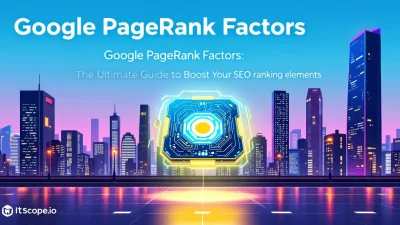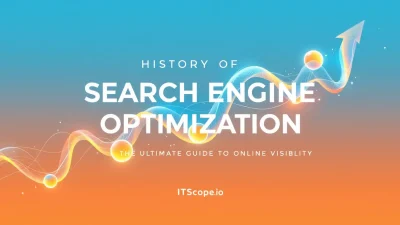Ready to demystify the beast that is the Google Algorithm? Welcome to your ultimate guide where we peel back the layers of this powerful search tool. Whether you’re an SEO pro or a curious beginner, understanding Google’s algorithm is crucial to mastering search rankings and driving traffic to your site.
In this guide, we dive deep into the intricacies of the algorithm, explore its constant updates, and unveil strategies to optimize your web presence like never before. Let’s embark on this journey to conquer the invisible yet impactful world of Google search. Ready to boost your knowledge and potentially your site’s visibility? Let’s get started!
Table of Contents
- History and Evolution of Google’s Algorithm
- Key Algorithm Updates and Their Impact
- Understanding Google’s Ranking Factors
- How to Optimize for Google’s Algorithm
- Common Misconceptions About Google’s Algorithm
- The Future of Search: Predicting Google’s Next Moves
- FAQs
- Conclusion
History and Evolution of Google’s Algorithm
The journey of the Google algorithm is nothing short of legendary in the realm of digital search. Since its inception, Google has consistently refined its search engine algorithms to enhance user experience, propel relevance, and ensure accuracy.
Early Innovations
Back in the late 1990s, Google’s founders, Larry Page and Sergey Brin, initiated the algorithm revolution with PageRank. This was a game-changer, assessing the importance of web pages by evaluating the quantity and quality of links pointing back to them – a clear shift from the keyword-driven results that were common then.
Major Algorithm Updates
Several updates have defined the Google algorithm evolution:
- Panda (2011): Focused on content quality by reducing the rank of sites with low-quality content.
- Penguin (2012): Targeted manipulative link-building tactics, promoting ethical link practices.
- Hummingbird (2013): Enhanced understanding of search queries, emphasizing semantic search.
- RankBrain (2015): Introduced AI to improve search results with machine learning.
Impact on SEO
Each update, particularly the dynamic new Google ranking algorithm variations, reshaped the SEO landscape. As Google refined its algorithms, websites need to adapt, focusing on high-quality, relevant content and natural backlink strategies.
Current State and Future Prospects
Today, the Google algorithm embodies sophisticated AIs and technologies like BERT, which interprets search intents at unprecedented levels. The journey does not halt here. With the constant updates, like those discussed in this comprehensive overview, webmasters must stay informed.
Dive deeper into mastering these updates with our SEO Tutorial: The Ultimate Guide to Master Search Rankings.
The evolution of Google’s algorithm holds the key to effective SEO strategies today and shapes the search landscape future. Mastering its complexities is essential for anyone serious about digital success.
Key Algorithm Updates and Their Impact
The evolution of the Google algorithm is a fascinating journey, filled with strategic shifts that have forever shaped the digital landscape. Understanding these changes is crucial for those aiming to optimize their sites effectively. Each update, like a ripple in a pond, affects rankings, site visibility, and ultimately, traffic.
Panda and Penguin Updates
The introduction of the Panda and Penguin updates marked a significant shift in how Google handled content quality and link integrity. Panda, launched in 2011, aimed to reduce the prevalence of low-quality sites in search results by targeting thin content. Meanwhile, Penguin, introduced in 2012, tackled spammy link practices, rewarding those who maintained a natural backlink profile.
Mobilegeddon and RankBrain
Fast forward to 2015, the advent of Mobilegeddon emphasized the importance of mobile-friendly site design. As mobile users soared, Google prioritized sites optimized for smaller screens. Then came RankBrain later that year, a leap into the realm of artificial intelligence. This update enhanced the ability of search engine algorithms to interpret user intent, refining search results based on machine learning.
| Update Name | Focus Area |
|---|---|
| Panda | Content Quality |
| Penguin | Link Integrity |
| Mobilegeddon | Mobile Optimization |
| RankBrain | User Intent Learning |
As Google’s algorithm continues to evolve, understanding these key updates equips you to align with the current landscape. For more comprehensive strategies, explore our SEO Tutorial: The Ultimate Guide to Master Search Rankings. Maximizing comprehension of these updates is your first step towards mastering the new Google ranking algorithm.
Adapting to these updates isn’t optional; it’s essential for maintaining competitive search visibility.
Understanding Google’s Ranking Factors
In the digital world, understanding Google’s ranking factors is like having the key to the kingdom. But what exactly influences the mighty Google algorithm? Many elements come into play, dictating how search engines position web pages and potentially boosting your visibility.
One of the biggest misconceptions is that search engine algorithms are unpredictable. However, Google made it clear through consistent updates that the core principles remain: relevance, authority, and user experience.
- Relevance: Matching user intent is pivotal. Google employs advanced techniques to understand context and deliver precise answers.
- Authority: Backlinks from reputable sources serve as endorsements, boosting your credibility within the digital ecosystem. Learn more about enhancing authority in our SEO tutorial.
- User Experience: Fast load times, mobile-friendliness, and secure connections promote higher rankings in the new Google ranking algorithm.
Significant Google Algorithm Updates
Not all updates are equal; some transform how we approach SEO. From Panda’s focus on quality content to RankBrain’s AI-based enhancements, each adjustment refines search results. Familiarizing yourself with these changes can give you a competitive edge.
Understanding and leveraging Google algorithm updates can elevate your search rankings.
For those hungry for more, explore exciting developments and strategic insights on handling Google’s dynamic landscape in our comprehensive guide.
How to Optimize for Google’s Algorithm
Unlocking the mysteries of the Google algorithm is key to elevating your website’s visibility. Have you ever wondered how some websites effortlessly soar to the top of search results? It’s all about adapting to the new Google ranking algorithm trends. Here’s how you can stay ahead of the curve and optimize effectively.
Understand Core Updates
Google constantly updates its algorithm updates. Familiarize yourself with these changes to align your strategy with Google’s focus areas. Core updates affect how search engine algorithms interpret your site, so staying informed is crucial.
Focus on Quality Content
Content quality is a throne in Google’s kingdom. Create content that’s valuable, accurate, and comprehensive. Engage your audience with insights that answer their questions, supported by data from trusted sources for credibility.
Mobile-Friendliness and Speed
With mobile searches surging, a responsive design isn’t optional—it’s essential. Optimize your site’s speed and usability for mobile users to comply with Google’s mobile-first indexing.
Did you know? Mobile-friendliness is a confirmed ranking signal used by the Google algorithm.
User Experience and Engagement
Prioritize a seamless user experience (UX). Fast loading pages, intuitive navigation, and engaging content boost user satisfaction, prompting longer visits and reduced bounce rates, which search engines reward.
By optimizing these elements, you’re on your way to mastering the Google algorithm. Dive deeper into these strategies in our comprehensive SEO Tutorial: The Ultimate Guide to Master Search Rankings.
Common Misconceptions About Google’s Algorithm
The Google Algorithm remains a mystery for many, leading to widespread myths and misconceptions. Understanding these can help refine your SEO strategies and avoid costly mistakes.
- Myth 1: All Updates Are Major Overhauls: While updates like Panda and Penguin shook the search landscape significantly, most changes are minor tweaks. Staying informed about major updates is crucial, but day-to-day changes often have limited individual impact.
- Myth 2: Google’s Algorithm Is Unchanging: Google tweaks its search engine algorithms regularly. Understanding the dynamic nature of the new Google ranking algorithm can keep you ahead of the curve.
- Myth 3: Keyword Stuffing Still Works: Using keywords unnaturally can harm your ranking. Instead, focus on creating quality content that utilizes search engine algorithms wisely. Learn more about best practices in our SEO Tutorial: The Ultimate Guide to Master Search Rankings.
Fact: Google’s algorithm undergoes regular tuning. Staying informed helps to adapt and thrive in the ever-evolving world of search.
For detailed historical insights, check out this comprehensive timeline of Google algorithm updates.
The Future of Search: Predicting Google’s Next Moves
In the ever-evolving world of search engine algorithms, anticipating the future course of the google algorithm is crucial for staying ahead. But how do you foresee what’s next?
Firstly, consider Google’s mission: organizing the world’s information for universal access and usefulness. This mission hints at potential trends in Google’s new google ranking algorithm.
Trending AI Enhancements
Artificial intelligence continues to shape search dynamics. Google’s RankBrain, a machine learning component, exemplifies this trend, adapting search results based on user intent. Expect AI to further fine-tune relevancy and user experience in upcoming updates.
Emphasis on User Experience
The future of the google algorithm focuses more heavily on user experience. Speed, mobile friendliness, and engaging content are key factors for search rankings as emphasized in our SEO Tutorial: The Ultimate Guide to Master Search Rankings.
Increased Focus on Semantics
Understanding content semantics—content meaning, not just keywords—continues to grow. Google’s BERT model, launched to grasp natural language nuances, indicates this trajectory, likely expanding to all search contexts.
Key benefit: Foreseeing Google’s moves helps tailor your SEO strategies effectively.
| Trend | Impact |
|---|---|
| AI Enhancements | Improved search relevance |
| User Experience | Higher SERP rankings |
| Semantic Understanding | Better content matching |
For a deep dive into historical changes, visit Google Algorithm History. Staying informed helps predict future shifts, preparing you for any revolutionary updates.
FAQs
What is a Google Algorithm?
A Google algorithm is a complex system used by Google to retrieve data from its search index and instantly deliver the best possible results for a query. These algorithms use a combination of rules and calculations to rank web pages.
How Often Does Google Update Its Algorithm?
Google updates its algorithm hundreds of times each year, though many are minor tweaks. Occasionally, Google releases significant updates that can greatly impact search engine results pages (SERPs). Learn more about major Google algorithm updates.
How Can I Keep Up with Google Algorithm Changes?
To stay informed of changes, follow trusted sources like Search Engine Journal, and regularly check Google’s official channels. It’s also wise to adhere to SEO best practices, such as focusing on quality content and user experience.
Can I Recover from a Google Algorithm Update?
Yes, recovery is possible but may take time. Analyze any potential penalties or ranking dips and make necessary improvements. Follow comprehensive SEO guides like our SEO Tutorial to enhance your site’s compliance with the latest updates.
What are Some Important Google Algorithm Updates to Know?
Some pivotal updates include Panda, Penguin, and Hummingbird. Each targeted specific aspects like content quality, backlink tactics, and understanding search queries. For an in-depth understanding, visit Ahrefs’ roundup.
Conclusion
Understanding the Google algorithm equips you to navigate the dynamic world of SEO with confidence. With each new Google ranking algorithm aiming for better search outcomes, staying updated is crucial. Dive deeper into the history of Google algorithms to refine your strategy. Stay proactive, keep learning, and evolve with the search engine algorithms to maintain your competitive edge.



